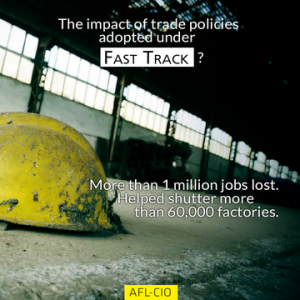 Legislators have introduced a bill that is bad for democracy and bad for America. The Fast Track legislation (S. 1900 and H.R. 3830), introduced by Sens. Max Baucus (D-Mont.) and Orrin Hatch (R-Utah) and Rep. Dave Camp (R-Mich.), would establish a process that allows no amendments and limited debate on such trade deals as the Trans-Pacific Partnership. Once legislators have the Fast Track ticket in their hands, they are free to agree to provisions that will send jobs overseas, reduce the bargaining power of workers, jeopardize health and safety regulations and gives corporations more control over our economy and our trading partners’ economies.
Legislators have introduced a bill that is bad for democracy and bad for America. The Fast Track legislation (S. 1900 and H.R. 3830), introduced by Sens. Max Baucus (D-Mont.) and Orrin Hatch (R-Utah) and Rep. Dave Camp (R-Mich.), would establish a process that allows no amendments and limited debate on such trade deals as the Trans-Pacific Partnership. Once legislators have the Fast Track ticket in their hands, they are free to agree to provisions that will send jobs overseas, reduce the bargaining power of workers, jeopardize health and safety regulations and gives corporations more control over our economy and our trading partners’ economies.
Fast Track legislation allowed the North American Free Trade Agreement (NAFTA) to be rammed through Congress with weak labor and environmental side deals. Since NAFTA went into effect in 1994, North American workers have experienced downward pressure on wages and a tougher organizing environment. Twenty years later, we find an unbalanced system in which profits soar even as workers take home a diminishing share of the national income.
More recent trade deals, like the World Trade Organization trade deal, had no labor or environmental standards at all. And other Fast Track trade deals have included Colombia, a country in which nearly 3,000 labor leaders and activists have been killed since 1986, and Korea—a country with which our trade deficit is already rising, and which, under the very low standards of the deal, can receive tariff benefits for cars that contain only 35% Korean content.
To really have trade deals with high standards, the American public must have more say—and that means no Fast Track authority from Congress.
The Baucus-Hatch-Camp- bill would do nothing to fix the U.S. trade deficit or grow the middle class. In fact, it would interfere with important health and safety regulations, ensure the primacy of investor rights over labor rights and boost profits and incomes for global corporations and the top 1%. But it will shrink the paychecks of working families and make it less likely that America’s children can climb the ladder of success.
The trade deals the Fast Track authority would influence are shrouded in secrecy. The bill doesn’t give the public any opportunity to improve a bad deal. Indeed, it doesn’t even require Congress or an independent body to evaluate the trade deal to ensure it has a positive impact on the U.S. trade balance, job creation or environmental protections before the Fast Track procedures apply—every deal, not matter how bad, is entitled to the same preferential treatment. If passed, the bill would:
- Keep the very low congressional “standards” that allowed weak trade agreements like NAFTA to pass;
- Keep the negotiating process behind closed doors, subject to too much Wall Street and special interest influence;
- Ensure that irresponsible corporations remain unaccountable for labor and environmental violations anywhere in their supply chain.
The Baucus-Hatch-Camp bill does not create a trade policy that is open for input, discussion and amendment. America’s workers want a trade policy that contains robust jobs, skills and investment packages that will allow U.S.-based companies and their workers to take advantage of any benefits of trade.
Such a jobs package should include things like:
- Improvements in trade enforcement, including enforceable disciplines on currency manipulation, so that workers don’t lose jobs when countries play currency games to make their products more affordable and U.S. products more expensive;
- A robust infrastructure package to create new jobs and facilitate the increased flow of goods to and from the United States;
- Reauthorization of critical job-creation agencies and programs, including the Export-Import Bank of the United States;
- Well-funded export advancement programs that promote products and services such as “Made in America”; and
- Comprehensive job training, education and worker safety net programs to ensure America’s workers can reap the benefits of trade and not just suffer the loss of well-paid, middle-class jobs.
Sign the petition and tell Congress that America needs jobs, not bad trade policy. Put the brakes on the “fast track” bill.




